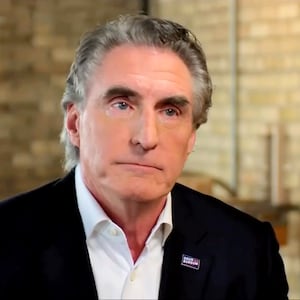Pay Dirt is a weekly foray into the pigpen of political funding. Subscribe here to get it in your inbox every Thursday.
Doug Burgum, the Republican governor of North Dakota, is running for president. But he has a problem: Most voters don’t know who he is.
Burgum has a solution for that—to make a splash on the debate stage. But there’s another problem: The Republican National Committee requires at least 40,000 individual donors as one of its criteria for allowing a candidate on the debate stage, and Burgum is far from the household name who could gather all those donors.
So Burgum, once again, came up with a novel solution. He wants to give 50,000 campaign donors $20 all-purpose gift cards in exchange for a $1 contribution. It’s a million-dollar gambit that could work a lot more effectively than spending $1 million on a meager number of television ads.
But the clever strategy could create its own set of thorny problems, according to experts who say it may not be legal. Beyond that, the RNC may or may not find it meets their new donor requirements for qualification.
The Daily Beast brought the question to seven experts in campaign finance law. All of them agreed on one thing: They’d never heard of anything like it. But while conversations were peppered with words like “desperation,” “gimmick,” and “thirsty,” the experts were divided on the legality.
Some believe the scheme, while perhaps unsavory, does pass legal muster as a campaign expense. Burgum would not need to qualify for the debate if he weren’t a candidate, they said, so in that sense his expenses pass the FEC’s “irrespective test.”
Other experts, however, argued that the ploy appears to be a reimbursement scheme, which would violate the “straw donor” ban—contributions in the name of another person. And some said it could add up to an en masse conversion of $950,000 in campaign funds to personal use, which would be another serious violation.
Burgum spokesperson Lance Trover told The Daily Beast that the giveaway actually has two purposes—a means to pull enough donors to get RNC approval, but also an outright monetary gift.
“Doug knows people are hurting because of Bidenflation and giving Biden Economic Relief Gift Cards is a way to help 50,000 people until Doug is elected President to fix this crazy economy for everyone,” Trover said. “It also allows us to secure a spot on the debate stage while avoiding paying more advertising fees to social media platforms who have owners that are hostile to conservatives.”
Legal experts pointed to that second point as justification for the expense, but the campaign, for whatever reason, didn’t mention that in its own solicitations. Neither Burgum’s tweets promoting the offer nor the language on the paid landing page say that the offer will help the campaign accomplish anything other than covering the cost of the donation and then some.
For all of Burgum’s challenges, he’s got one advantage: The billionaire software developer turned governor doesn’t have to worry about how much this ploy would cost. For Burgum, it’s like lifting up the couch cushions: $1 million is one one-thousandth of $1 billion.
Federal campaign finance laws allow candidates to fill their campaign accounts with as much of their own money as they want, a rule that gives a leg-up for ultra-wealthy candidates like Burgum, former Sen. Kelly Loeffler (R-GA), or one-time Democratic presidential longshot Michael Bloomberg. (And thanks to a Supreme Court ruling last year, candidates can also repay themselves with as much campaign money as they want, including money from individual donors.)

Republican presidential candidate North Dakota Governor Doug Burgum waits for the start of the Fourth of July Parade in Merrimack, New Hampshire.
REUTERS/Brian SnyderAs for the permissibility of the giveaway, Saurav Ghosh, director of federal reform at government watchdog Campaign Legal Center and a former enforcement attorney with the Federal Election Commission, falls in the “legal” camp.
“It does seem desperate, but I don’t really see a legal problem with it as long as everything is disclosed,” Ghosh told The Daily Beast.
Jordan Libowitz, communications director for Citizens for Responsibility and Ethics in Washington, offered a similar assessment.
“This is the single thirstiest thing I’ve seen in politics,” Libowitz told The Daily Beast. But he concluded that the move is “probably explainable” as traditional campaign spending. “If Burgum doesn’t get on that debate stage, the campaign is over,” he said.
Other experts, however, observed possible violations of the lines that Ghosh and Libowitz drew.
Michael Kang, a campaign finance specialist and professor at Northwestern University’s Pritzker School of Law, believes the arrangement violates the straw donor ban.
“The straw donor error is that you’re disclosing that you’re the contributor, when really it’s someone else,” Kang said. “In this case, it’s the campaign.”
Paul S. Ryan, a campaign finance expert and deputy executive director at the Funders’ Committee for Civic Participation, expressed the same concern, adding that the original source of the money is not actually the campaign, but Burgum’s own investment in his candidacy.
“It’s the candidate’s money through a reimbursement scheme, so presumably these reports will be false, listing a donor’s name when it’s not really the donor,” Ryan said. When any of those donors passes the $200 threshold that requires disclosure of their personal information, he said, the Burgum campaign would appear to be in violation if those reports included the gift card donation.
(Ghosh disagreed, saying a reimbursement with campaign funds “is like dividing by 0 in campaign finance world.”)
Caleb Burns, a partner at the law firm Wiley Rein, explained that the restriction on using campaign funds for personal use is limited to situations where the campaign funds are spent for reasons “irrespective” of the campaign.
“You can’t use campaign funds to pay the mortgage on your family home, but if an expense is tethered to a campaign purpose, then campaign funds can be spent without limit,” Burns said.
According to some experts, Burgum’s own explanation, as well as the language the campaign is presenting to donors in the fundraising solicitation itself, are essentially admissions that his operation is converting as much as $950,000 in campaign funds to personal use.
While qualifying for a debate would certainly appear to pass the “irrespective test,” neither Burgum’s explanation nor the fundraising landing page allude to the debate. (Both statements also call the gifts “Biden Economic Relief” cards.)
“People are hurting because of Bidenflation, and giving Biden Economic Relief cards is a way to help 50,000 people until we get in office and fix this crazy economy for everyone!” Burgum tweeted on Monday, including a link to the fundraising solicitation and its similar pitch.
“When it comes to providing economic relief to the American people, I’m not messing around!” Burgum added.
Brendan Fischer, a campaign finance expert and deputy director of Documented, told The Daily Beast that this appears to be an open acknowledgment that the campaign is violating the law, noting that the statute applies the personal use ban as covering “any person”—which would appear to include donors.
“Burgum is using campaign funds to cover people’s personal expenses, which is precisely what the law prohibits,” Fischer said, adding that the campaign “should have asked the FEC for an advisory opinion,” but “may have calculated that the notoriously deadlocked FEC is unlikely to enforce the law.”
Fischer and Kang also wondered if the FEC would be concerned about the legitimacy of the expense. They pointed to former Democratic presidential longshot Andrew Yang’s idea of giving a group of supporters $1,000 cash as a real-world experiment for his universal basic income proposal, a move that raised legal questions in the 2020 primary.
(Tech entrepreneur and fellow GOP longshot Vivek Ramaswamy unveiled his own fundraising innovation this week, offering a 10 percent commission for any supporter who “bundles” money from other donors—essentially paying them as independent contractors.)
Former FEC commissioner Ann Ravel, a Democrat, said that while the exchange “seems inappropriate,” she expressed doubt that the donation scheme would violate bans on straw donations or vote-buying.
“FEC regulations do not apply specifically to a situation where a candidate gives money or makes expenditures to encourage contributions to the campaign of the candidate for purposes related to the campaign,” Ravel told The Daily Beast, though she added that “the personal use issue might be applicable.”
Rick Hasen, director of the Safeguarding Democracy Project at the University of California School of Law and author of the Election Law Blog, defended Yang’s proposal at the time, but sees the Burgum case differently.
“The difference here and what creates the potential problem is the literal reimbursement of campaign donors for their donations,” he told The Daily Beast.
Hasen previously made a similar point to Ravel’s—that Yang’s plan would be legal unless it were tied to voting. While the Burgum giveaway is not paying for votes in an election, a legal line, it could be seen as paying for the required informal measure of support to qualify for the debate.
An RNC spokesperson didn’t return a request for comment. But a Republican source familiar with the early debate format planning told The Daily Beast that, while the party weighed the pros and cons before implementing the new qualification rule—which Democrats used in 2020—they didn’t foresee Burgum’s scheme.
“I don’t think any of us envisioned that scenario. He’s thinking outside of the box,” the Republican said, adding that no one has complained yet.
“I think it’s innovative, and he has the money to do it,” the person said, adding that “everybody’s talking about him” at the RNC.
“I don’t think he’ll do it for long,” the source said. “He got a lot of headlines.”
Jake Lahut contributed to this report.








